Against expectations, patients who isolate before surgery 20% more likely to develop post-operative lung complications

New research published in Anaesthesia shows that, against expectations, patients isolating before surgery (mainly to avoid COVID-19 and its complications) are actually at a 20% increased risk of developing post-operative lung complications compared with patients who do not isolate. This goes completely against the current guidance in common use which mandates isolation before surgery.
The study was delivered by the University of Birmingham-led GlobalSurg-COVIDSurg Collaborative: a global collaboration of over 15,000 surgeons working together to collect a range of data on the COVID-19 pandemic.
A total of 96,454 patients from over 1,600 hospitals across 114 countries were included in this new analysis, and, overall, 26,948 (28%) patients isolated before surgery. Post-operative pulmonary complications were recorded in 1947 (2.0%) patients of which 227 (11.7%) were associated with SARS-CoV-2 infection.
Patients who isolated pre-operatively were older, had more respiratory comorbidities and were more commonly from areas of high SARS-CoV-2 incidence and high-income countries. Although the overall rates of post-operative pulmonary complications were similar in patients who isolated and those that did not (2.1% vs. 2.0%, respectively), pre-operative isolation was associated with a 20% increased risk of post-operative pulmonary complications after adjustment for age, comorbidities, and type of surgery performed. The rate of post-operative pulmonary complications also increased with periods of isolation longer than 3 days, with isolation of 4 to 7 days associated with 25% increased risk of post-operative lung complications and isolation of 8 days or longer associated with a 31% increased risk.
These findings were consistent across various environments whether or not other protective strategies were in place (pre-operative testing and COVID-free pathways), showing that regardless of those other strategies, pre-operative isolation does not seem to protect surgical patients from post-operative pulmonary complications or death.
Looking at the possible reasons for these unexpected findings, one of the study's lead authors, Senior Lecturer and Surgeon Dr. Aneel Bhangu, from the University of Birmingham-led National Institute for Health Research (NIHR) Global Health Research Unit on Global Surgery, says: "Isolation may mean that patients reduce their physical activity, have worse nutritional habits and suffer higher levels of anxiety and depression. These effects in already vulnerable patients may have contributed to an increased risk of pulmonary complications. Further, there is increasing evidence demonstrating that prehabilitation (preconditioning) before surgery improves patient recovery and outcomes. It is possible that isolation may have, therefore, conversely led to patient deconditioning and functional decline, adversely influencing their outcomes."
Co-lead author, Dr. Joana Simoes, a Research Fellow at the University of Birmingham's NIHR Global Health Research Unit on Global Surgery, adds: "Our evidence suggests that removing pre-operative isolation strategies is unlikely to lead to worse post-operative outcomes for patients, but institutions should monitor their post-operative pulmonary complication rates as strategies evolve."
The authors do however warn that the study does not take into account the risk of transmission of SARS-CoV-2 from patients to other patients and staff in hospital. They say: "The benefits of pre-operative isolation are not only for the individual patient but also for other patients and staff in hospitals who are at risk from asymptomatic carriers of SARS-CoV-2."
The authors say: "Healthcare providers may wish to take these findings into consideration when reviewing local and national guidance. Relaxation of pre-operative isolation policies appears to be safe for individual patients, especially in the presence of pre-operative testing, which this and previous studies showed to be beneficial. Selected isolation practices may remain in place in certain conditions (such as high-risk patients and periods of high community prevalence)."
They add: "Further research is needed to explore the most effective method for maintaining patient fitness and conditioning in patients that are isolating, which may include home or remote prehabilitation using telephone or online methods."
More information: Effects of pre‐operative isolation on postoperative pulmonary complications after elective surgery: an international prospective cohort study, Anaesthesia (2021). DOI: 10.1111/anae.15560


















